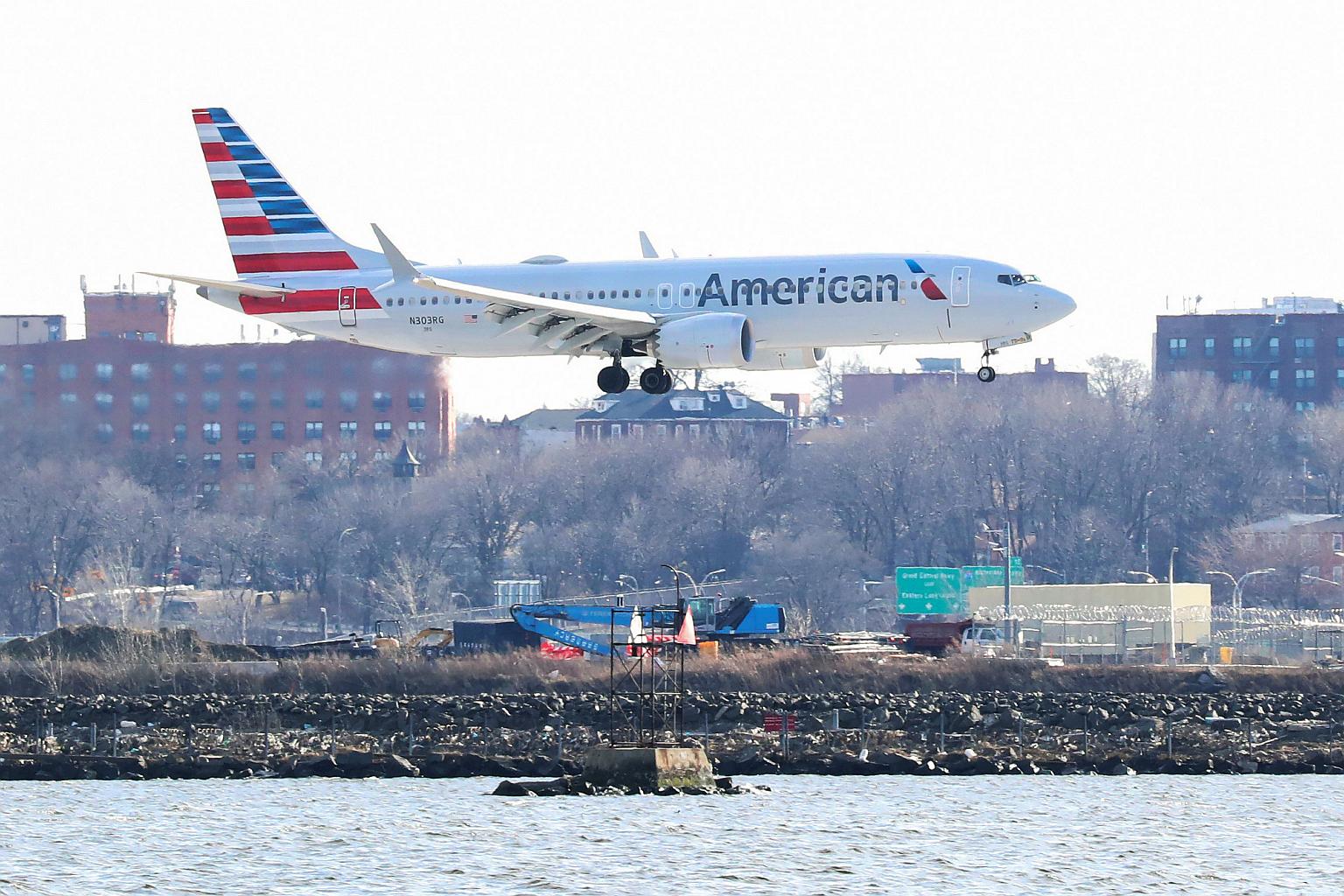Airlines keep calm and carry on after Boeing jet groundings
Sign up now: Get ST's newsletters delivered to your inbox

The 737 Max 8 upgrade to Boeing's best-selling jet only entered service in 2017, meaning there are not many in the skies compared with other more established work horses.
PHOTO: REUTERS
Follow topic:
SINGAPORE/DUBAI (REUTERS) - Groundings of brand-new Boeing 737 MAX 8 jets have sent shockwaves through global aviation after a crash in Ethiopia, but many airlines are managing to keep to schedule with other jets while economic woes mean some may be grateful for a pause.
The 737 Max 8 upgrade to Boeing's best-selling jet only entered service in 2017, meaning there are not many in the skies compared with other more established work horses.
"If you had a grounding of something like the 737-800, wow what an impact. But with the MAX, there are fewer than 400 of these flying globally," one aviation analyst said, adding that most airlines could "backfill most of the capacity".
The Ethiopian Airlines crash that killed 157 people on Sunday (March 10) was the second 737 MAX crash in less than five months, with 189 others killed when a Lion Air jet went down in Indonesia last October.
There were 371 of the 737 MAX family jets in operation before this week's groundings, led by China, according to Flightglobal. Around two-thirds of the fleet is now grounded, based on Reuters calculations.
That compares to more than 6,000 of the previous model, the 737 NG series, giving airlines the ability to use other jets in their fleets as a replacement for at least some of the flights.
"At present the impact of any groundings is contained by the relatively small global fleet currently in service," aviation consultant John Strickland told Reuters.
The time of year and signs of concerns about a peak in global aviation growth and a slowdown in the economy means cutting capacity is not necessarily negative for airlines.
"It is off-season so it is an easier gesture to make, and some airlines are more worried about having too much capacity," a Western aviation official said.
For others who are able to make do without the 737 MAX 8 for a period, doing so is likely to come at a cost.
"It is a headache for airlines to take aircraft out of service with flights likely to be cancelled and an impact on revenues," Strickland added.
Although March is not a peak season for flights, some have been hit, with Chinese aviation data firm Variflight on Monday saying at least 29 international and domestic flights had been cancelled.
However, airlines had swapped for other planes on 256 other flights that had been scheduled to use the 737 MAX 8.
Singapore's Changi Airport said on Tuesday that one planned 737 MAX flight by Shandong Airlines to and from Jinan had been cancelled, but others had gone ahead with different aircraft.
Singapore Airlines Ltd, Indonesia's Lion Air and Garuda Indonesia and state-backed carriers Air China, China Eastern Airlines and China Southern Airlines all have large fleets of jets other than the MAX to draw on, the analyst said.
The bigger impact from the Ethiopian crash could be on future deliveries, since other carriers including Korean Air Lines have placed relatively large orders for 737 MAX 8 jets, said Um Kyung-a, a senior analyst at Shinyoung Securities.
"It might turn into a big headache for them if Boeing fails to nail down the causes of the recent crashes," Um said. "If that turned out to be the case, they need to come up with different plans to replace their 737 MAX 8 orders."
Brazil's largest airline, Gol Linhas Aereas Inteligentes, has 100 Boeing 737 Max 8 jets on order. It currently operates seven such planes, which it decided to ground late on Monday.
Gol operates Boeing 737 models exclusively and announced in December that it was accelerating its transition to the newer MAX 8 planes by leasing 11 more from the second half of this year.
Flydubai, which has 13 737 MAX jets, said it was adjusting its schedule to minimise disruption to passengers, including switching flights to older 737s. Fiji Airways said it would use other 737s and Airbus SE A330s to cover for the grounding of two 737 MAXs.
Lion Air, which suffered a 737 MAX crash in October, has refused to take delivery of some of the jets but analysts say it is suffering from overcapacity and may benefit from a slowdown.
It threatened in November to cancel Boeing orders in a row over the crash but has yet to do so, industry sources said. Airbus is another supplier and is seen in talks to sell more.
Malaysian officials said on Monday they had asked national carrier Malaysia Airlines to revisit its order for 25 737 MAX jets.
"I feel there are other factors apart from safety, including finance and politics, for that move," said Shukor Yusof, the head of Malaysia-based aviation consulting firm Endau Analytics.
"I doubt there will be outright cancellations for orders already placed by other carriers because there are still many unanswered questions."

